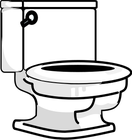KFC, McDonalds Get Headache In Dirty Water

It’s a new day, and that means time for the latest new scandal surrounding a foreign company doing business in China. This time McDonalds (NYSE: MCD) and Yum’s (NYSE: YUM) KFC are in the spotlight for serving water that contains excess levels of bacteria. This scandal is just the latest in a nonstop stream for foreign companies this month, providing plenty of food for domestic media during the summertime that is usually considered a slow period for news.
It’s hard to say if the sudden rapid-fire revelation of so many scandals involving foreign companies is deliberate or just coincidence, since the nature of the scandals is quite different. But I suspect that at least some of the timing is deliberate, as Beijing seeks to use this kind of news to discredit foreign brands that generally enjoy a better reputation than their Chinese rivals. Such scandals are also good headline grabbers, helping to divert attention from a nonstop stream of domestic headaches like the slowing economy, and China’s own steady revelations of new corruption and food safety scandals. The negative headlines could also partly reflect Beijing’s frustration with a number of probes by western governments against Chinese firms over the last year.
I’ll admit my attention was drawn to the latest story by a somewhat misleading headline, which read “KFC Ice Cubes Found Dirtier Than Toilet Water”. (English article; Chinese article) That headline implies that water served by KFC is somehow equivalent to the dirty water found in a toilet containing urine or excrement.
But “toilet water” here really just means “tap water”, since the water used to fill a toilet comes from the same source as the water used from the tap of a kitchen sink. Many people say that tap water in China should be boiled first to kill any germs or bacteria, though I personally believe such water in major cities like Beijing and Shanghai is safe to drink directly.
But returning to the news, the dirty water discovered at KFC and McDonalds was actually contained in ice cubes served in the chains’ drinks. The news came from CCTV, an official Party mouthpiece that is also considered a leader in this kind of investigative reporting. It said that bacteria levels in the ice cubes from KFC were 19 times higher than the amount allowed under national standards, and 12 times higher than levels in toilet water. McDonalds exceeded the standards, but by much less, and its ice cube bacteria levels were lower than those found in toilet water.
In all fairness, the report did also target one popular local Chinese chain, Kung Fu, which was also discovered to also have excessive bacteria levels in its ice cubes. I’ll admit the findings of the report are just slightly alarming, because they appear to show the 3 chains may be directly using tap water in their ice cubes without boiling it first or using other treatment to kill bacteria.
Not surprisingly, KFC issued the pro forma apology and said it would take steps to remedy the problem. McDonalds and Kung Fu also issued statements saying they took the report seriously, but stopped short of issuing any actual apologies. The scandal is just the latest headache for KFC, which last year was found by another CCTV report to have excessive levels of antibiotics in some of its chicken. The company also took a big hit this spring during the H7N9 bird flu outbreak in Shanghai, as consumers avoided eating chicken.
Revelations from this latest scandal are almost certainly accurate, though I suspect other Chinese companies are probably guilty of similar practices. This scandal is the newest in a longer stream of negative news on foreign companies that began early this month, ensnaring drug makers, milk powder producers and packaging products giant Tetra Pak. Based on the trend, I doubt this latest scandal will be the last, and would advise foreign companies to brace themselves for more negative headlines in the next 2 months.
Bottom line: A new food safety scandal at KFC and McDonalds is part of a recent string of negative reports focused on foreign firms, with more likely to follow.
Related posts:
